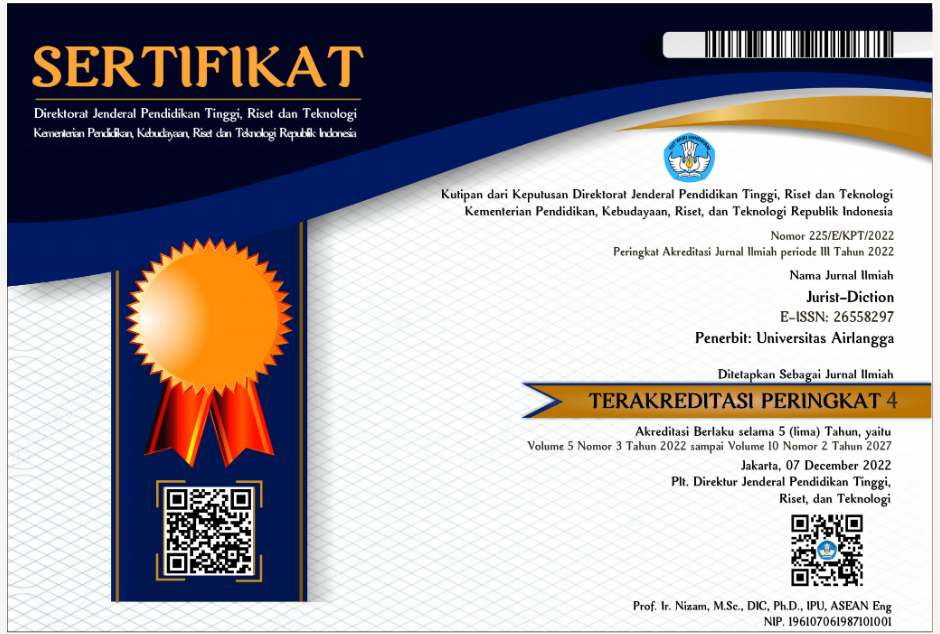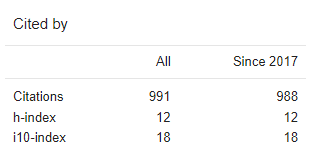Reconstructing Electronic Legislation to Strengthen Public Accountability: Lessons from Indonesia
This paper examines the role of public participation in electronic legislation, with particular reference to the Indonesian context. It assesses whether electronic legislation can operate as a mechanism for strengthening legislative accountability. The study employs a normative legal method, supported by doctrinal analysis of positive law, to evaluate the relationship between normative expectations and their legal realization. The findings indicate that the current framework for electronic legislation lacks comprehensive norms on public participation, resulting in fragmented and inconsistent standards. The absence of binding rules undermines accountability and weakens the democratic quality of lawmaking. To address this gap, the paper proposes a reconstruction of participation norms through a re-evaluation of the concept of electronic legislation. This reconstruction binds all actors to participation requirements. It also compels legislatures to engage actively in the design and implementation of electronic systems. In turn, it reinforces accountability, transparency, and inclusiveness in the legislative process.
Buku
Diver LE, Digisprudence: Code as Law Rebootued (Edinburg University Press 2022)
Gaffar JM, Politik Hukum Pemilu (Konstitusi Press 2012)
Hayek FA, The Constitution of Liberty (University of Chicago Press 2011)
Indrati S. MF, Ilmu Perundang-Undangan 1: Jenis, Fungsi, Dan Materi Muatan (Revision, Kanisius 2013)
Kurnia TS, Sistem Hukum Indonesia: Sebuah Pemahaman Awal (First, Mandar Maju 2016)
Marzuki PM, Penelitian Hukum (15th edn, Prenada Media Group 2021)
OSCE Office for Democratic Institutions and Human Rights, Guiding Principles of Democratic Lawmaking and Better Laws (OSCE Office for Democratic Institutions and Human Rights 2023)
Rishan I, Teori Hukum & Konstitusi (1st edn, Sinar Grafika 2024)
Bab dalam Buku
Inoue T, ‘The Rule of Law as the Law of Legislation’ in Luc J Wintgens (ed), Legislation in Context: Essay in Legisprudence (Ashgate 2007)
Kishan MC, Yanto O and Jeconiah BAS, ‘Harmonisasi Undang-Undang: Peran Machine Learning Dalam Single-Subject Rule’, Proceeding of Law Research Institute Conference 2023 (Padjajaran Law Research & Debate Society 2023)
Meer TW. van der and Zmerli S, ‘The Deeply Rooted Concern with Political Trust’ in Tom W. van der Meer and Sonja Zmerli (eds), Handbook of Political Trust (Edward Elgar Publishing 2017)
Natania B, ‘Menuju Partisipasi Publik Yang Adil Dan Bermakna’ in Moh Fadli and others (eds), Monograf Dekonstruksi Perundang-Undangan Indonesia: Menggapai Cita-Cita Ideal Pembentukan Peraturan Perundang-Undangan (Fakultas Hukum Universitas Brawijaya 2022)
Rauta U and Kishan MC, ‘Studi Asas Kejelasan Rumusan Dalam Pembentukan Undang-Undang: Omnibus Law Tematis’ in Rofi Wahanisa (ed), Dinamika Pemilihan Umum dan Penyelenggara Negara sebagai Implementasi UUD 1945: Bidang Hukum Tata Negara (Istana Agency 2024)
Roznai Y, ‘Amendement Powers, Constituent Power, and Popular Sovereignty: Linking Unamendability and Amendement Procedures’ in Richard Albert, Xenophon Contiades and Alkmene Fotiadou (eds), The Foundations and Traditions of Constitutional Amendment (1st edn, Hart Publishing 2017)
——, ‘“We the People”, “Oui, the People” and the Collective Body: Perceptions of Constituent Power’ in Gary Jacobsohn and Miguel Schor (eds), Comparative Constitutional Theory (Edward Elgar Publishing Limited 2017)
Framework and Insights for Improved Governance Programming’ (2021)
Wahid F and Sæbø Ø, ‘Understanding EParticipation Services in Indonesian’ in Linawati and others (eds), Information and Communication Technology (Springer 2014)
Wahyuningdyah RW, ‘Digitalisasi Pembentukan Peraturan PUU’ in Inosentius Samsul (ed), Prosiding Seminar "Pembentukan Peraturan Perundang-undangan: Evaluasi dan Tantangan ke Depan (Badan Keahlian Dewan Perwakilan Rakyat Republik Indonesia 2024)
UNDP Oslo Governance Centre, ‘Trust in Public Institutions: A Conceptual Yeung K and Lodge M, ‘Algorithmic Regulation: An Introduction’ in Karen Yeung and Martin Lodge (eds), Algorithmic Regulation (Oxford University Press 2019)
Jurnal
Carter R, ‘“High-Quality” Legislation – (How) Can Legislative Counsel Facilitate It?’ (2011) 4 The Loophole 41
Fajri MN, ‘Legitimasi Partisipasi Masyarakat Dalam Pembentukan Undang-Undang Di Indonesia’ (2023) 20 Jurnal Konstitusi 123
Gusman D, ‘Pembentukan Undang-Undang Secara Elektronik Dalam Sistem Perundang-Undangan Di Indonesia’ (2024) 4 Jurnal Ilmu Hukum, Humaniora dan Politik 329
Kurnia TS, ‘Ketetapan MPR Sebagai Interpretasi Konstitusi: Perlukah?’ (2020) 3 Jurnal Majelis 87
——, ‘Otonomi Daerah Dan Demokrasi : Kritik Terhadap Pendapat Mujani Dan Liddle Tentang Mandat Populis Kepala Daerah Titon Slamet Kurnia’ (2023) 6 Undang: Jurnal Hukum 415
Marzuqoh AA, ‘Prinsip Akuntabilitas Dalam Pemilihan Hakim Konstitusi’ (2020) 3 Jurist-Diction 1373
Olivia D, ‘Legal Aspects of Artificial Intelligence on Automated Decision-Making in Indonesia: Lessons from the European Union, the United States, and China’ (2020) 7 Lentera Hukum 301
Pamungkas B and Yusuf M, ‘Smart-Legislation for Meaningful Participation in Urban Policymaking: An Overview Post-Issuance of Act Number 13 of 2022’ (2023) 1 Journal of Interdiciplinary Law and Legal Issues 25
Ramli TS and others, ‘Pengenalan Hukum Teknomlogi Informasi Dalam Pemanfatan Over The Top Untuk Pendidikan’ (2021) 5 ACTA DIURNAL Jurnal Ilmu Hukum Kenotariatan 78
Rauta U, ‘Menggagas Pemilihan Presiden Yang Demokratis Dan Aspiratif’ (2014) 11 Jurnal Konstitusi 600
Reber M, ‘American Principles of Self-Government’ (2003) XX Education and Culture 8
Rishan I, ‘Konsep Pengujian Formil Undang-Undang Di Mahkamah Konstitusi’ (2021) 18 Jurnal Konstitusi 1 <https://jurnalkonstitusi.mkri.id/index.php/jk/article/view/1811/pdf>
Sihombing EN and Adi Syaputra MY, ‘Implementasi Penggunaan Kecerdasan Buatan Dalam Pembentukan Peraturan Daerah’ (2020) 14 Jurnal Ilmiah Kebijakan Hukum 419
Wafi MA and Izzi MMB, ‘Integrasi Electronic Participation Dalam Proses Legislasi Sebagai Optimalisasi Pemenuhan Meaningful Participation’ (2024) 21 Jurnal Konstitusi 518
Widodo H, ‘Parameter Pengawasan Politik Dewan Perwakilan Rakyat Republik Indonesia Menurut Undang-Undang Dasar Negar Republik Indonesia Tahun 1945’ (2019) 19 Perspektif Hukum 229
Williams B, ‘The Popular Mandate on Constitutional Amendments’ (1921) 7 Virginia Law Review 280
Laman
Kamus Besar Bahasa Indonesia, ‘Cara’ <https://kbbi.web.id/cara>
——, ‘Tanda Tangan’ <https://kbbi.web.id/tanda tangan>
Kertas Kerja
Kossow N, Windwehr S and Jenkins M, ‘Algorithmic Transparency and Accountability’ (2021)
Loughlin M, ‘The Concept of Constituent Power’ (2013)
Przeworski A, ‘Self-Government in Our Times’ (2008) 07
Schmitter P, ‘Political Accountability in “Real-Existing” Democracies: Meaning and Mechanisms’ (2007)
UNDP Oslo Governance Centre, ‘Trust in Public Institutions: A Conceptual Framework and Insights for Improved Governance Programming’ (2021)
Peraturan Perundang-undangan
Undang-Undang Dasar Negara Republik Indonesia Tahun 1945
Undang-Undang Nomor 11 Tahun 2008 tentang Informasi dan Transaksi Elektronik (Lembaran Negara Republik Indonesia Tahun 2008 Nomor 58, Tambahan Lembaran Negara Republik Indonesia Nomor 4843)
Undang-Undang Nomor 12 Tahun 2011 tentang Pembentukan Peraturan Perundang-Undangan (Lembara Negara Republik Indonesia Tahun 2011 Nomor 82, Tambahan Lembaran Negara Republik Indonesia Nomor 5234)
Undang-Undang Nomor 17 Tahun 2014 tentang Majelis Permusyawaratan Rakyat, Dewan Perwakilan Rakyat, Dewan Perwakilan Daerah, dan Dewan Perwakilan Rakyat Daerah (Lembaran Negara Republik Indonesia Tahun 2014 Nomor 182, Tambahan Lembaran Negara Republik Indonesia Nomor 5568)
Undang-Undang Nomor 42 Tahun 2014 tentang Perubahan atas Undang-Undang Nomor 17 Tahun 2014 Tentang Majelis Permusyawaratan Rakyat, Dewan Perwakilan Rakyat, Dewan Perwakilan Daerah, dan Dewan Perwakilan Rakyat Daerah (Lembaran Negara Republik Indonesia Tahun 2014 Nomor 383, Tambahan Lembaran Negara Republik Indonesia Nomor 5650)
Undang-Undang Nomor 19 Tahun 2016 tentang Perubahan Atas Undang-Undang Nomor 11 Tahun 2008 Tentang Informasi Dan Transaksi Elektronik (Lembaran Negara Republik Indonesia Tahun 2016 Nomor 251, Tambahan Lembaran Republik Indonesia Negara Nomor 5952)
Undang-Undang Nomor 2 Tahun 2018 tentang Perubahan Kedua atas Undang-Undang Nomor 17 Tahun 2014 tentang Majelis Permusyawaratan Rakyat, Dewan Perwakilan Rakyat, Dewan Perwakilan Daerah, dan Dewan Perwakilan Rakyat Daerah (Lembaran Negara Republik Indonesia Tahun 2018 Nomor 29, Tambahan Lembaran Negara Republik Indonesia Nomor 6187)
Undang-Undang Nomor 13 Tahun 2019 tentang Perubahan Ketiga atas Undang-Undang Nomor 17 Tahun 2014 tentang Majelis Permusyawaratan Rakyat, Dewan Perwakilan Rakyat, Dewan Perwakilan Daerah, dan Dewan Perwakilan Rakyat Daerah (Lembaran Negara Republik Indonesia Tahun 2019 Nomor 181, Tambahan Lembaran Negara Republik Indonesia Nomor 6396)
Undang-Undang Nomor 15 Tahun 2019 tentang Perubahan atas Undang-Undang Nomor 12 Tahun 2011 Tentang Pembentukan Peraturan Perundang-Undangan (Lembaran Negara Republik Indonesia Tahun 2019 Nomor 183, Tambahan Lembaran Negara Republik Indonesia Nomor 6398)
Undang-Undang No. 13 Tahun 2022 tentang Perubahan Kedua atas Undang-Undang Nomor 12 Tahun 2011 tentang Pembentukan Peraturan Perundang-Undangan (Lembaran Negara Republik Indonesia Tahun 2022 Nomor 143, Tambahan Lembaran Negara Republik Indonesia Nomor 6801)
Undang-undang Nomor 1 Tahun 2024 Perubahan Kedua atas Undang-Undang Nomor 11 Tahun 2008 tentang Informasi dan Transaksi Elektronik (Lembaran Negara Republik Indonesia Tahun 2024 Nomor 1, Tambahan Lembaran Negara Republik Indonesia Nomor 6905)
Peraturan Pemerintah Nomor 71 Tahun 2019 tentang Penyelenggaraan Sistem dan Transaksi Elektronik (Lembaran Negara Republik Indonesia Tahun 2019 Nomor 185, Tambahan Lembaran Negara Republik Indonesia Nomor 6400)
Putusan Pengadilan
‘Putusan MKRI No. 1/PHPU.PRES-XXII/2024’ (2024)
‘Putusan MKRI No. 27/PUU-VII/2009’ (2010)
Copyright (c) 2025 Marcelino Ceasar Kishan

This work is licensed under a Creative Commons Attribution 4.0 International License.
Jurist-Diction (P-ISSN 2721-8392, E-ISSN 2655-8297), published by Universitas Airlangga, is licensed under the Creative Commons Attribution 4.0 International License (CC BY 4.0).
This license permits users to:
- Share – copy and redistribute the material in any medium or format;
- Adapt – remix, transform, and build upon the material for any purpose, including commercial use.
These freedoms are granted under the following conditions:
Attribution – You must provide appropriate credit, include a link to the license, and indicate if any changes were made. This may be done in any reasonable manner, but not in a way that suggests the licensor endorses you or your use.
No additional restrictions – You may not apply legal terms or technological measures that restrict others from exercising the rights granted under the license.
Note: As of Volume 5, No. 1 (2022), Jurist-Diction has adopted the Creative Commons Attribution 4.0 International License (CC BY 4.0), replacing its previous license (CC BY-NC-SA).


















